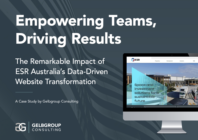A Better Version of Yourself
Scott Shute may be VP of Customer Operations at LinkedIn, managing the customer experience for the nearly 500 million people, but his second title at the company might be even more impressive: Chief Mindfulness Officer. He’s spent the last few years on a passion project, building momentum and creating space for LinkedIn’s mindfulness program, while brainstorming best practices with like-minded mindfulness leaders at places like Google, eBay, and Intel. His goal is a simple one: to get everybody practicing mindfulness. We sat down with him to find out what drives this passion:
Mindful: It’s amazing that LinkedIn’s mindfulness program that has touched thousands of employees so far. Can you tell us a bit about how the mindfulness program started and how it grew?
Scott: A couple years a go I was meeting with the guy who leads our global health and wellness program, and towards the end of the meeting, when we were done our regular agenda, I said, “Do do we do anything with meditation here?” He mentioned that they had in the past and then, almost intuitively, asked, “Wait, can you do something?” I said yes, a bit hesitantly—and then went back to my desk and did nothing for three months.
Mindful: What do you think made you pause?
Scott: I was just in my own way. I was cautious about “coming out” as a meditator. It certainly felt like it would be accepted, but my inner dialog questioned whether, as a leader at the company, it was the right thing to do. And then I wondered if it was even okay that I take it on. So, a few months later, I scheduled a meeting with the VP of H.R. about something else, and at the end of that meeting I said, “hey, I’m thinking about leading a meditation class.” Not only was she all for it, she wanted me to report back to her on how it was going—which meant I was really on the hook for it. But that’s what I needed to get me over the hump.
I was just in my own way. I was scared to “come out” as a meditator.
Mindful: Did a lot of people show up in the beginning?
Scott: I started a weekly thing and the first time—there was no publicity. And I think one person showed up. He must have been intimidated because he never came back. Then it slowly grew to three people the next time, five the next, and eight the next. Now I’ve been leading the class for over two years and we’ve probably had 700-1000 people experience meditation. I’m not the only one—we have classes in over ten different locations globally.
Mindful: And how did you get from a “weekly thing” to having a fully formed mindfulness program at LinkedIn?
Scott: Around November of last year I took as moment to appreciate all of the good stuff going on at LinkedIn: We have great meditation sessions globally, we have a great speaker series featuring top mindfulness teachers, we have an online self-paced learning program called Mindful Moments, with about three hours of content, we’ve got Fred Kofman, who’s written some books on conscious business, teaching classes here and being part of our executive development program. We have all this great stuff going on but we didn’t really have a program—there was no mindfulness program. So, I raised my hand, kind of in the same I did a few years ago, asking all the right people at the company: Hey is it okay if I do this? And then I got together a bunch of other like-minded people and we’ve created a wrapper around everything, and now we have an official mindfulness program. We’re still forming, but now we have some infrastructure to get some cool stuff done.
Mindful: How did you go about creating the infrastructure? Were you inspired by the mindfulness programs at other companies?
Scott: Absolutely. We wanted to build a world-class mindfulness program, so we started researching what that looks like. I tracked down everybody I could find who was doing this at other companies. I found an article that mentioned that Intel was leading Awake at Intel, for example, and I chased that down and reached out to find out what they were doing. We ended up pulling together a group of about eight people, all leading mindfulness efforts at their workplace: Google, SAP, eBay, Genentech, Intel, Aetna, and others. We got everyone together in November for the first time for two purposes: to share best practices and to start a community of like-minded individuals. It’s our passion project.
When we are mindful, we’re just much better versions of ourselves. I think we are more compassionate, better listeners, our emotional intelligence goes up, we can focus on the right things— everything gets better.
Mindful: What are your goals for the program at LinkedIn?
Scott: First, we’re trying to build awareness of all the great stuff we already have and think about it in a more conscious, holistic way. It’s not the perfect analogy, but I think of it kind of like the sales funnel: There are around 10,000 people at LinkedIn. The ultimate goal would be if everybody developed a lifelong practice—if they’re practicing something every day. That’s probably not going to happen. But if you can imagine a funnel, where at the top there are 10,000 LinkedIn employees, it would be great if we could get 5,000 of them to meditate once, or we get 1,000 of them to come to a class, or we could get 300 of them to come to an in-depth workshop, and then maybe it’s 100 who develop a lifelong practice.
If we think about that consciously, then we can have offerings at the company for every stage of that funnel. Maybe it’s simple awareness practices for people at the very beginning, all the way to in-depth, leader-led intensive workshops at the end to move people from awareness into daily practice. We don’t have all of that put together yet, but we’re creating the strategy, the vision, and the infrastructure, so that when there’s energy for it, it can fit and it can all makes sense.
Mindful: And what do you imagine Linked-In would be like if you meet some of these goals.
Scott: Well, I think, first of all, we would be happier. There would be better collaboration, better problem solving. I don’t talk a lot about productivity, but I think productivity would actually go up. I think you’d actually have a business result that would be positive—you’d have a great return on investment. But generally I think people would have more fulfilling, happier lives.
When we have a practice, whatever that looks like for you as an individual, when we are mindful, we’re just much better versions of ourselves. I think we are more compassionate, better listeners, our emotional intelligence goes up, we can focus on the right things— everything gets better.


